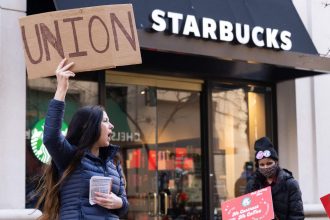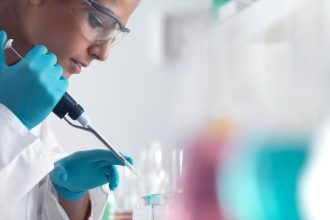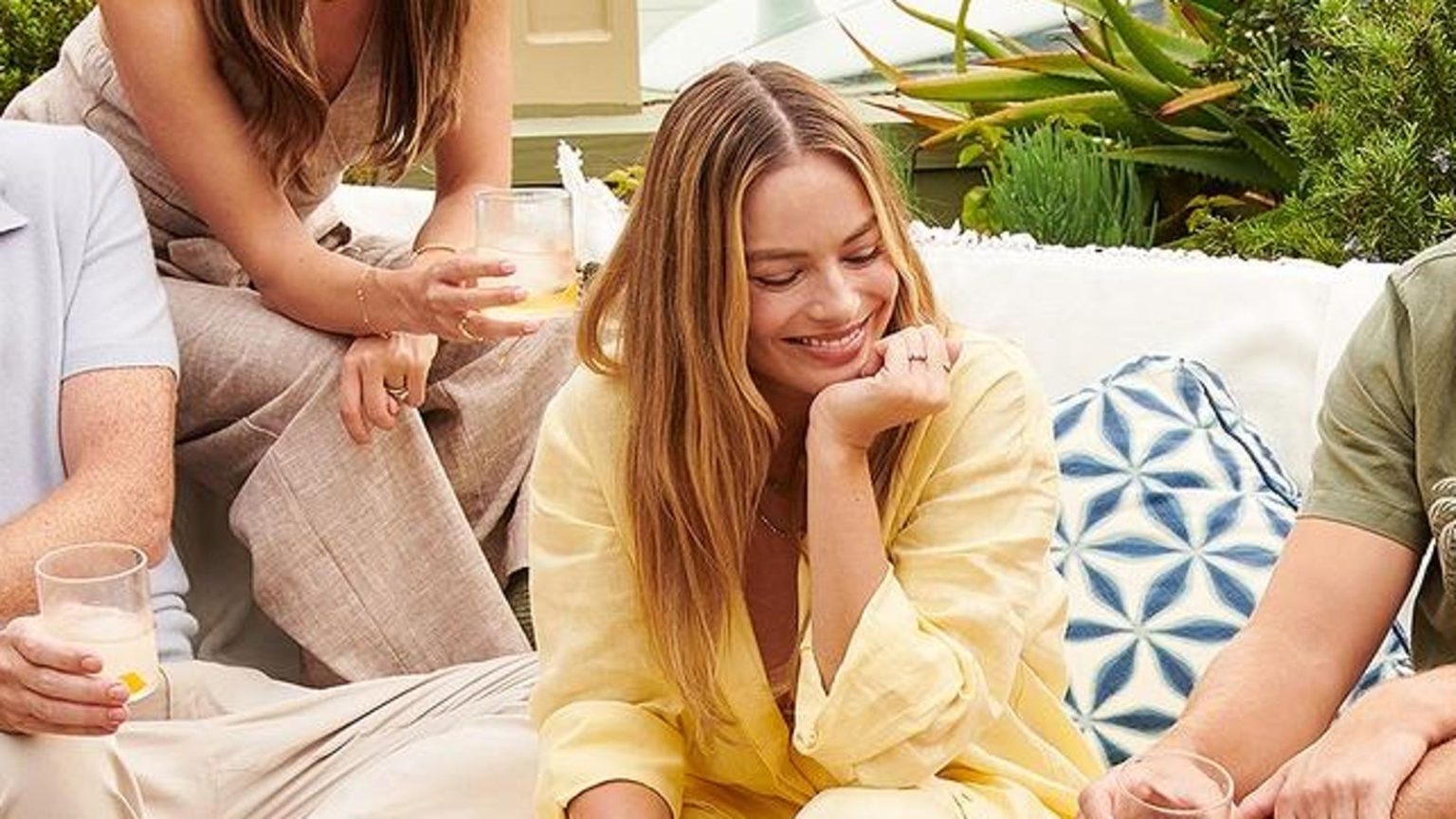Margot Robbie’s star power could easily overshadow any project she’s involved in–and she knows it. Despite soft-launching a gin brand, Papa Salt Coastal Gin, in Australia last year, the Oscar-nominated Barbie star has taken little credit.
In fact, when asked if I wanted to talk to her about the brand’s recent UK launch, I was told it was imperative I interviewed her husband, Tom Ackerley, and three fellow co-founders (close friends Josey McNamara, Regan Riskas, and Charlie Maas), too.
I was intrigued; for an industry segment hell-bent on plastering celebrity faces on products they’ve had little (if anything) to do with, this never–and I mean never–happens.
“I’ve had great success and so much fun creating things I love with my friends – our production company, LuckyChap, being the shining example of that,” says Robbie. “Papa Salt was another chance to do that.”
And both companies share similar inceptions. The idea for LuckyChap came to Robbie and her friends after getting drunk with Ackerley and McNamara at the London premiere of The Wolf of Wall Street, deciding to move into a house together in Clapham, and thereafter vowing to launch the production company (which, in the ten years thereafter, would be responsible for some of Hollywood’s most celebrated risks, including I, Tonya, Promising Young Woman, Saltburn, and Barbie).
“I’ve had great success and so much fun creating things I love with my friends—our production company, LuckyChap, being the shining example of that,” says Robbie. “This was another chance to do that.”
The idea for Papa Salt was conceived similarly, over drinks with friends–including gin-loving Brits Ackerley and McNamara–at a gathering in the US. “We are all avid food and drinks people, we always love to try a new restaurant, support local producers, or find a new bottle that we love,” says Ackerley.
“What we were finding, living in the States, is that you only really have access to a few big brand gins and there wasn’t much space for upcoming and exciting craft gin distillers. We asked ourselves how hard it would be to create a gin so that we could drink it in some of the places we love to go – and that started us on the journey.”
The natural synergy that evolved from their previous ventures, plus the passion Riskas and Maas had for the project, made it something of a no-brainer. “Charlie incidentally has three generations of family in the spirits industry, so that helps too!” he adds.
The close-knit group worked on every detail together, with Riskas emphasizing, “during the development process, all five of us were at every single meeting together and pride ourselves on that. The five of us founders make every strategic and creative decision together, big or small.”
Of course, given the potential pitfalls of being labeled a ‘celebrity booze brand,’ Robbie had slight concerns.
“It took us five years to create Papa Salt, and for the first few years, we weren’t sure if we’d even end up selling it publicly–for precisely that reason,” she says. “We thought we might just make 1000 bottles for ourselves and our friends to drink and hope that would last us at least 10 years!” she jokes.
“In the end, the five of us felt so immensely proud of what we created we wanted to share it with the world.”
Of course, no five-year project is an easy one. The gin-making process was a learning curve for everyone involved, particularly in understanding how flavors transform once distilled. “It took a long while to wrap our heads around it,” says Ackerley. “A flavor you might like in a botanical, like the sweetness of vanilla, may become too intense after being distilled. It was a long journey studying distilled botanical essences and then mixing our own compound gins before we felt comfortable suggesting new ideas for the recipe.”
Sustainability was a key consideration from the start, too. Though the founders looked at many possible distillery partners in Australia, Lord Byron Distillery stood out to them as a zero-waste, renewable energy-powered facility.
“It was the draw right from the start.” says Maas, as was his personal connection with Lord Byron’s owner, Brian Restall. “Brian’s story reminded me of my grandfather, who was a chemical engineer who later moved into distilling. Brian’s story is very similar: he’s an engineer who builds renewable energy projects in his daytime, and a wonderful distiller on the weekends.”
“After that, Brian started sending us gin samples via post, as the borders were still closed during Covid. We all tasted the first sample together in the garden. We took a sip and knew immediately: this guy can make a great gin.”
The difficulty lied in finding their gin. The Papa Salt gin. “Part of the joy of this process has been the collaboration between the five of us, but that collaboration also presented challenges as it is five people with different palates,” says McNamara.
“We all love gin but have slightly different preferences, depending on the drink, so we had to have a really open approach to flavor profiles and experimenting with things that pushed us out of our individual comfort zones.”
Because of this, it took 59 recipes to reach the final product, but McNamara believes it’s also why they’ve created such a versatile gin. The final recipe highlights distinct Australian botanicals including wattle seed, wax flower, and oyster shell, most of which are sourced locally to the distillery.
Of all the things they had to get right before launching, the name–Papa Salt–came easiest. And, with it, an endearing backstory. “Papa Salt is a real man—imagine Santa Claus on a beach holiday,” says McNamara. “We met him at a beach bar in Sri Lanka, but he was from the Gold Coast in Australia. We had one of those long days full of drinks and stories with Papa Salt and thought we would never see him again. When we were trying to name the brand, we kept coming back to the idea that it should capture the essence of that day with Papa Salt. It just seemed to fit. Luckily, we’ve been able to see him again, as he joined us for a few drinks when we were in Australia last year.”
Thankfully, the hard work paid off. The gin’s initial run sold out within 48 hours of its Australian launch, both delighting and panicking its founders.
“We were waiting on more bottles to arrive—they were on a boat headed towards Australia and we had about two months before they were landing,” Maas recalls. “It was apparent we needed much more product than we initially thought.”
While the delay wasn’t ideal, the founders took control of everything they could, asking the distillery to prepare all future orders (“Lord Byron was great—they made Papa Salt every day for weeks on end!”) and, once the bottles landed in Australia, filling them up straight away to hit shelves just before summer.
“After we filled that initial order, we knew we needed a bigger still, so we commissioned two beautiful 1200L stills this year, and we’re hopeful those will supply what we need for the next couple years.”
Despite quintupling its capacity, and experiencing rapid growth, the team remains small. “Officially, there’s only one other employee: shout out to our COO Carl [Willuweit]! You’re the best, Carl!” Maas exclaims. “We needed someone in Australia who could look after both the market and production. Carl lives near the distillery and has extensive experience in the Australian market. He’s been a godsend.”
The team’s hard work and dedication were further validated when Papa Salt won a Gold Medal at the San Francisco World Spirits Competition. “We love our gin, and to get that validation from such an esteemed panel means a lot. We feel like proud parents!” says Riskas.
Papa Salt’s recent UK launch has been something of a masterclass in utilizing the power of celebrity without exploiting it. Robbie, who is currently pregnant, was drinking from a light blue can marked ‘Mama Salt’ while she attended Wimbledon, knowing she would be photographed by paparazzi at the event, whether she liked it or not.
It was the unofficial announcement of Papa Salt’s canned Palomas–also photographed, thanks to Ackerley drinking them by her side—which will launch later this year. Yet another savvy move for the UK, where the ready-to-drink (RTD) cocktail market was estimated at $58.1 million in last year, expecting to grow at a compound annual growth rate (CAGR) of 16.2% from now to 2030.
“I grew up in and around London, and I’m confident the UK has the greatest gin culture in the world—don’t tell Margot,” McNamara quips. “We want Papa Salt to be a staple in bars and pubs; a brand that earns its spot on the back bar by providing something new to consumers. Once we make it to my local, that will feel like a real accomplishment.”
As the team balances their existing careers with their new roles at Papa Salt, Maas runs the business day-to-day, with everyone else putting as much time as they can into its expansion and promotion. “This is a passion project for all of us and as with anything you love, you make time for it,” says Riskas. “Our Papa Salt group chat is going off day and night!”
“Essentially we do all the fun stuff and leave the spreadsheets to Charlie!” jokes Robbie.
It’s clear that this was never Margot Robbie’s gin. This was theirs, and–in an industry where celebrity often outshines substance–they’re making every effort to stand out from the crowd. A reminder that when you’re doing something you love, with people you care about, the results tend to speak for themselves.
Read the full article here





